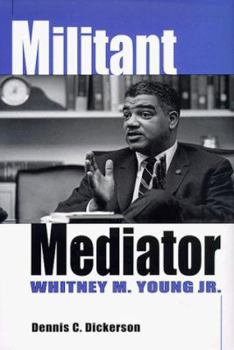Militant Mediator
Select Format
Select Condition 
Book Overview
During the turbulent 1960s, civil rights leader Whitney M. Young Jr. devised a new and effective strategy to achieve equality for African Americans. Young blended interracial mediation with direct... This description may be from another edition of this product.
Format:Hardcover
Language:English
ISBN:0813120586
ISBN13:9780813120584
Release Date:March 1998
Publisher:University Press of Kentucky
Length:384 Pages
Weight:2.00 lbs.
Dimensions:1.2" x 6.4" x 9.6"
Related Subjects
African-American & Black African-American Studies Biographical Biographies Biographies & History Biography & History Civil Rights & Liberties Ethnic & National Historical Political Science Politics & Government Politics & Social Sciences Social Science Social Sciences Specific Demographics Specific TopicsCustomer Reviews
1 rating
Worth Reading, but it Drags
Published by Thriftbooks.com User , 25 years ago
Whitney Young was a very effective leader in the fight for equal rights for everyone. He was effective both in fund-raising and in resolving conflicts. He learned to speak the language of the whites he had to deal with, so that they preferred to deal with him rather than with more militant black leaders who were unable or unwilling to speak to whites in terms whites were used to. He had the knack of knowing how far he could push whites toward fairness to blacks without getting their backs up, but never taking a straight "no" for an answer. He would accept less than what he really wanted, but always more than the other side really wanted to give. He made good use of the fact that prejudiced whites would generally prefer to compromise with him rather than deal with the more confrontational black leaders. Dickerson recounts Young's life from birth to death. It is a story well worth reading, of a brilliant and dedicated person who made a substantial contribution to the progress of racial relations, and whose methods future leaders could do well to study and emulate. Unfortunately, the narrative drags at times. Young brought to each new challenge the same impressive list of strengths; enumerating them yet again eventually becomes tiresome. watziznaym@gmail.com






